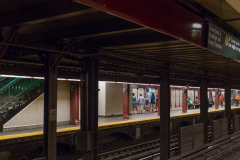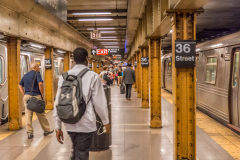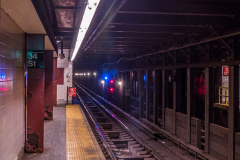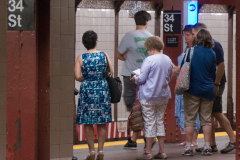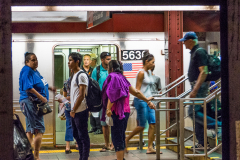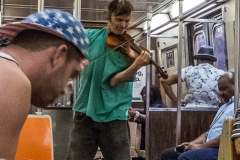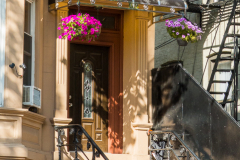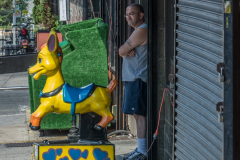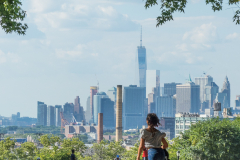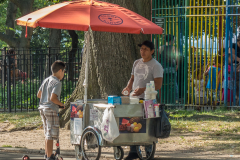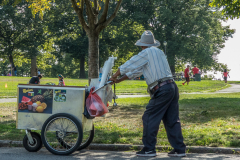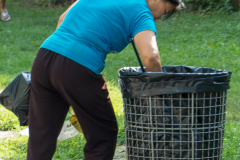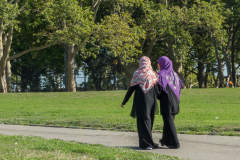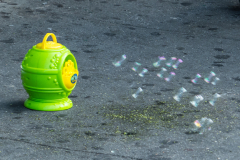I remember NY as a kid. Baseball and adventures with my grandfather, a New York cabbie who taught me how to play euchre and pinochle and other games no one my age ever played, who played semi-pro baseball with a glove so shapeless it might as well have been a leather bag, but never threw me a ball I couldn’t catch and sat me down amongst real baseball when the Dodgers, Giants, and Yankees all were the fabric of one city. Who serenely drove a cab in that honking New York, and taught me to drive like a New York Cabbie. Whose apocryphal brother was a minor mobster, or so the legend went and was proven true; who drank milk chocolate-colored coffee while dunking Lorna Doons which he shared until the box was gone; Who would park me at the soda fountain around the corner and buy me an egg cream (only the New York kind are authentic) and a comic book, sometimes the very expensive 25 cent variety. Then he’d disappear while I studied the latest Tarzan dictionary (Yo! Mangani!), Superman and Mister Mxyzptlk, and sometimes a Combat comic which I found most entertaining when the sound effects- crack-a cracka, rat-a-tat-a-atat—were read aloud.
The soda fountain floor was black and white tile, the counter was mahogany with a marble top; the soda jerk was one of my grandfather’s friends. I could browse the endless array of Classics Illustrated (reserved for my mother to buy me,) and I felt totally safe and comfortable, even with my grandfather in another part of the store and out of sight. It wasn’t until I was an adult and upon his sad, lonely death, that I realized his backroom disappearances during these frequent trips had as much to do with playing the numbers as it did to my comic book contentment. Not that it mattered to the kid I was. He probably bet on the ball games too. Not that it mattered to the kid I was.
My grandfather, who squandered his paycheck, alienated his son, ignored my mother, his daughter, but treated me like prince, who bribed me a dollar-a-floor to ride our Bronx apartment building elevator that frightened me so much I ran up the gothic back steps (whose dark landings frightened me just slightly less) to avoid using it. My Grandfather, who outlived my grandmother by four years, died alone in a white rented room the size of a closet and lay dead for two days before he was discovered. I never visited him there. I didn’t even know the address. My jury is comprised of two daughters and three grandsons. The verdict is pending.
Walks with my mother to the three movie theaters on Bruckner Boulevard, truly a place of parks and fountains, delicatessen restaurants, water fountains-very important to a little kid—got to stop at each one—and bakeries with big windows open to the street and a post-movie Charlotte Russe ( now a ‘lost food’ of New York.*) if the double feature had been particularly good, and I didn’t ask for too many sweets inside. Trips further up to her grandmother’s apartment, set on a small square of its own. I was allowed any outfit I wanted, so pictures of me exist parading on the boulevard as Daniel Boone, as a cowboy, and, sorry to say, a kid in shorts and a tie when I had to dress up for Mom.
Trips with my uncle down Canal Street, mostly to the junk stores that populated it then when he was looking for equipment for his metalwork hobby—“Carry this for me,” he’d say, handing me a forty-pound anvil we had unburied, while he carried an armload of brass.
The family followed the exodus to suburbs eventually, but NYC was our locus, relatives, doctors, the museums, Central Park where Errol Flynn and I held forth on Belvedere Castle’s walls, and, especially The Bronx Zoo where I’m sure I held part ownership of the Wishing Chair in The Children’s Zoo. The Children’s Zoo is different now, the Wishing Chair gone, but during one adult visit, I found an old park street-sweeper who remembered it exactly and showed me the spot. Even in High School, a Saturday night trip or a shopping excursion with my friends (hockey equipment at Gerry Crosby’s; once I carried a Scuba tank and rig home on the subway and train…people minding their own business on NY Subways) was still the norm.
Of course, all that changed. The city became more expensive, more dangerous, more difficult to navigate in a car, more difficult to manage on a slim paycheck. Infrastructure swelled, the suburbs grew, I got older and my adventures took me elsewhere, only returning from time to time during moments of disruption. Penniless in 1968, choosing daily between subway fare and food from the Automat, waiting for the Military draft to finally bring me to Whitehall Street, I wandered avenues, found and lost jobs and girlfriends, sang in dim folk clubs, and ultimately retreated away partly as a result of the Mammoth Garbage Strike when the trash was piled in mountains**, as was my dismay.
There is simply no place like New York City. It spoils you in a subtle but engulfing way. I didn’t know until I was middle-aged and world-traveled, that New York was a singularly unique city that should not be taken for granted, especially by those for whom its day-to-day vibrancy and turmoil is a matter of course. But retired teachers who built lives elsewhere do not cavalierly move back when income is fixed and the NYC cost of living is 140% of the national average. So I visit family who, at no prompting from me, have established lives in NY and its environs. And I take pictures of the life there now which in its rich ethnicities and confusions, its enormous range of wish and frustration, hope and misery, failure and perseverance, wealth and poverty, shifting demographics, and 19th-century politics remains as the hub of possibility for its millions. Those lives, both ordinary and extraordinary, impact the pavements, venues, subway steps, escalators, waterfronts, and meadows I traveled when I was younger then, and, however briefly, today can walk in their footsteps and the memory of my own.
* http://www.politico.com/states/new-york/albany/story/2012/02/lost-foods-of-new-york-city-charlotte-russe-067223
** (http://untappedcities.com/2015/02/11/today-in-nyc-history-the-great-garbage-strike-of-1968/)
